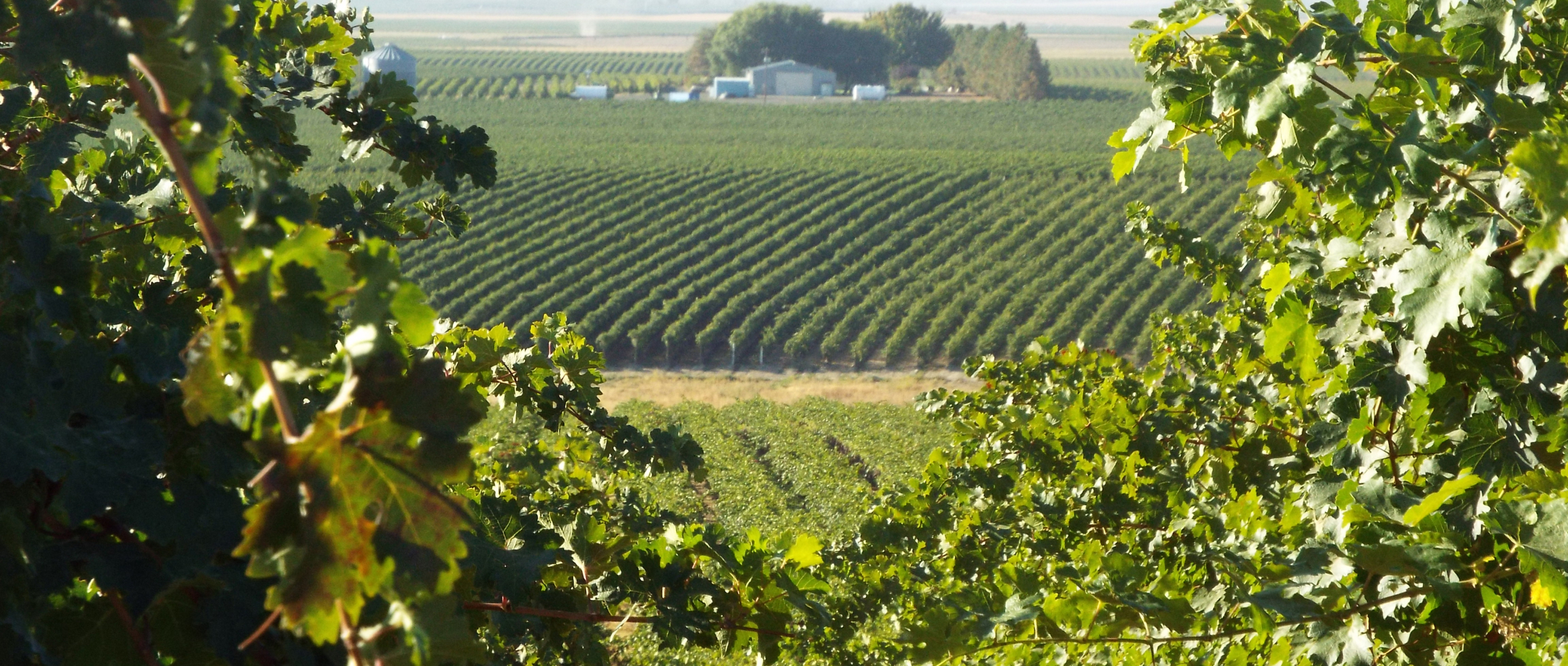Coyote Canyon Vineyard: Its success has been
based on a tradition of trying something new
When Mike Andrews signed a contract with Ste. Michelle Wine Estates to grow 20 acres of Cabernet Sauvignon in 1994, that was ground zero for Coyote Canyon Vineyard.
By Ken Robertson
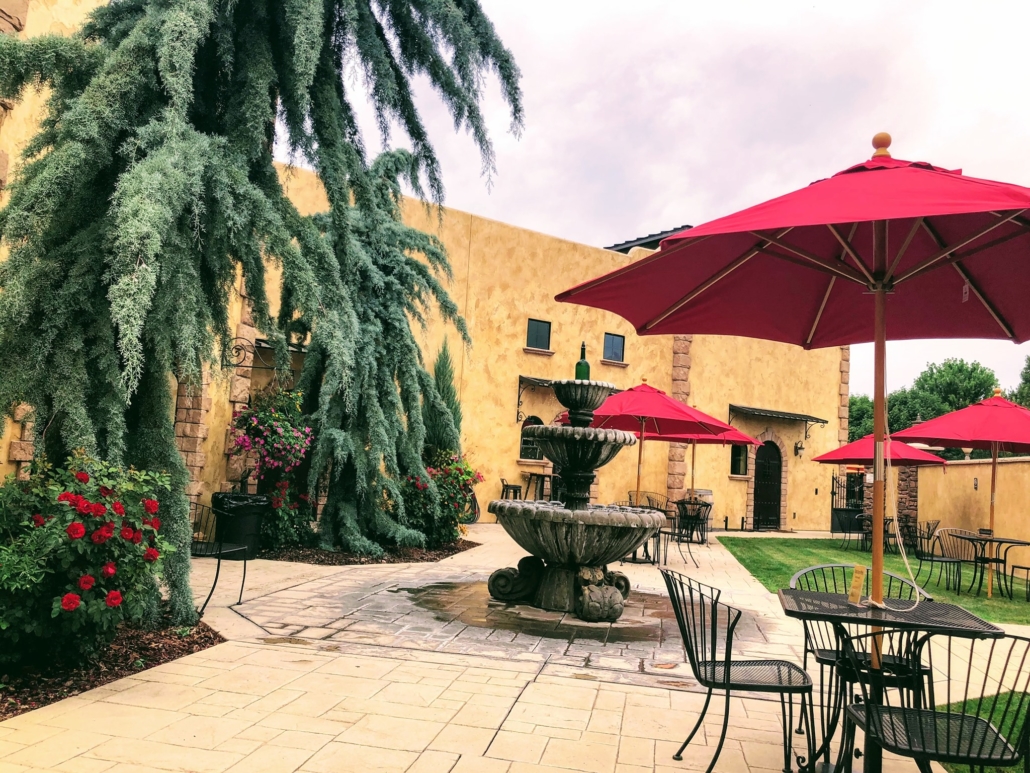
The Winemaker’s Loft in Prosser’s Vintners Village has been the home to Coyote Canyon Winery’s tasting room since 2008. It’s at this beautiful facility where Mike Andrews and his crew host wine tasting events on a regular basis throughout the spring and summer months.
High lonesome can barely begin to describe the western end of Washington’s dusty Horse Heaven Hills before World War II. Nevertheless, after years spent domesticating farmland for others, George and Mabel Smith still bought 7,800 acres of its driest, most remote slopes, aiming to raise dryland wheat.
Then, before they could get a good start, the U.S. Navy took over their land for an aerial gunnery training range. Finally, once the war was over, their luck turned, and they could go back to the land.
Soon after that, their luck took another good turn. Daughter Louise returned to the family homestead, husband Bob Andrews in tow. After a few years of working the land, Bob decided they needed to try something new for his growing family to prosper.
The family agreed, and they gambled on drilling a well to find enough water to transform their acres into rows of better-paying crops than wheat. Bob’s faith that they could succeed paid off, and they added some of the region’s traditional crops and registered cattle, including a bull they called Big John that would become rather famous thereabouts.
Family photos from the 1950s and ‘60s show a smiling, proud family dressed to tackle chores, school or whatever else a day might bring.
When the cattle business took one of its periodic nosedives in the 1970s, son Mike wanted to hang onto that part of the enterprise, so the family allotted him a section of land to pursue that.
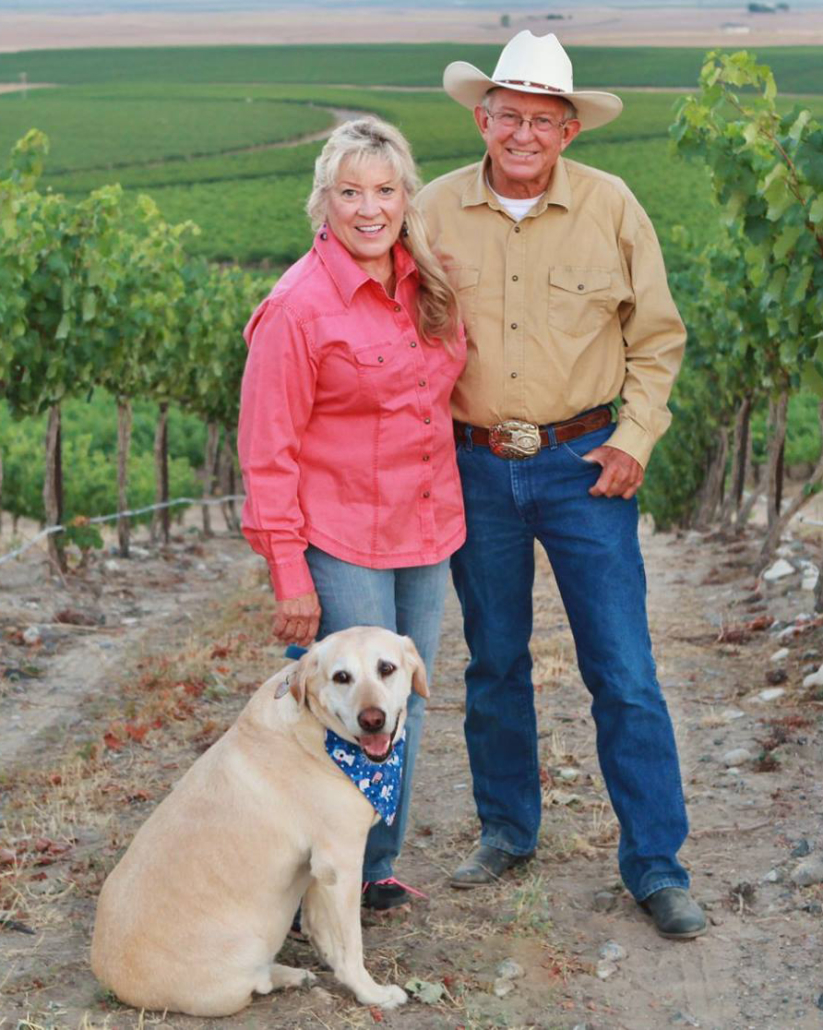
Mike Andrews and his wife Marti are pictured above with their trusty yellow lab, Charlie, who was Coyote Canyon vineyard’s official greeter for many years. Unfortunately, Mike and Marti lost Charlie in 2016 at the age of 15.
As the economic pressures mounted, that land, at between 1,000 to 1,100 feet of elevation, would turn out to be “some of the best grape-growing property in all of Washington,” a history that Coyote Canyon Vineyard and Coyote Canyon Winery now proudly proclaim.
It was a change of plans brought on when Chateau Ste. Michelle Wine Estates offered Mike a contract to plant 20 acres of Cabernet Sauvignon, and he jumped at the opportunity, planting his first vines in 1994. Within three years, he partnered with his father Bob, eventually expanding to 450 acres of wine grapes over the next dozen years.
Showing some of the family’s risk-taking heritage that had served them well into a third generation, they decided to plant an array of lesser-known grapes as well, including Counoise and Cinsault from Southern France, Albariño and Graciano from Spain, and Nebbiolo from Northern Italy.
Years of experience and plenty of advice from experts have taught Mike a lot about grape growing. “We cover the fruit (with the leaf canopy) more than we used to,” he noted. “And we get a wider variety of flavors in the wine.”

Justin Michaud, winemaker at Coyote Canyon Winery, speaks enthusiastically about all his wines, but his face lights up when he talks about Coyote Canyon’s Spanish varietals, especially Albariño, which he now produces in three variations.
He calculates that Coyote Canyon Vineyard now stretches over 1,300 acres and includes 26 kinds of grapes native to France, Spain, Portugal, Italy and Croatia. Over the years, he and the family members involved in the venture have grown to include his sons Jeff and Macauley, who each have specific roles to play.
Jeff has focused on bringing the operation into the 21st Century by adopting new technological innovations, and focusing on that will carry the family’s four-generation legacy into the future. Macauley’s expertise is in computer programming, cyber security and technology application in the day-to-day operations of the vineyard.
Mike points out that it’s no simple task to manage the vines to Ste. Michelle’s exacting standards, cater to the needs of another 20 to 25 wineries and winemakers who buy Coyote Canyon fruit and then ensure that Coyote Canyon Winery’s needs are also met.
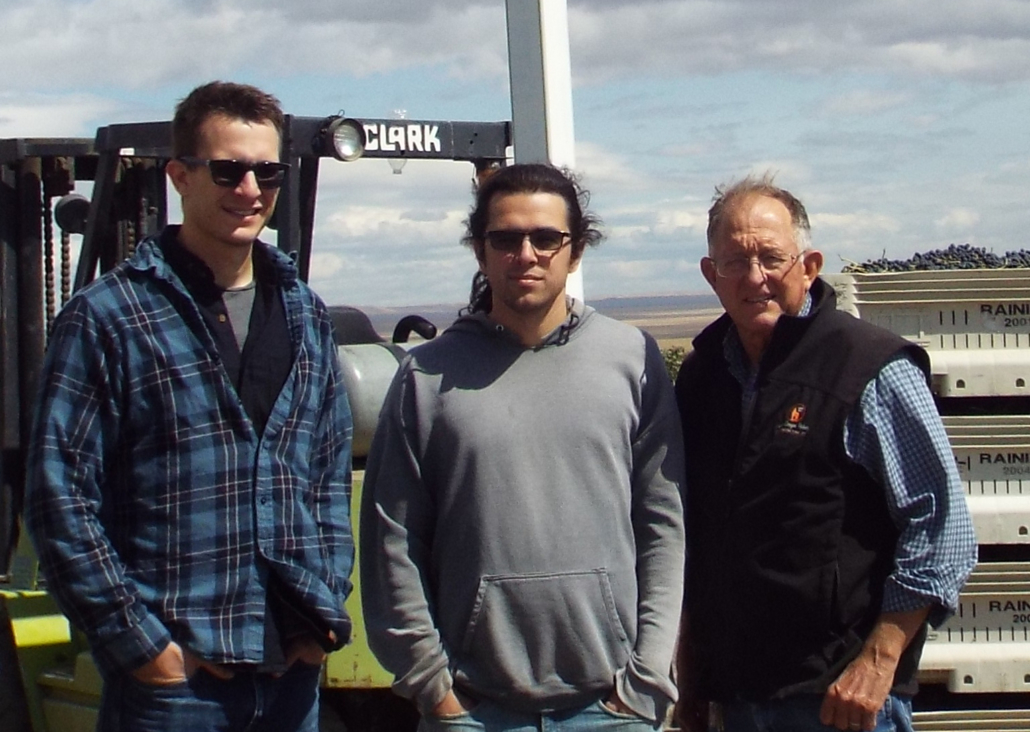
Mike Andrews (above right) is the proud papa of sons Jeff (above left) and Macauley, who play integral roles in the day-to-day operations of Coyote Canyon Vineyard.
Production of grapes in tons per acre has slowly been shaved back, said Mike, so that reds are held to 2½ to 3 ½ tons per acre and whites to about 5 tons per acre during a two-month harvest season that kicks off in late August or early September each year.
Ste. Michelle typically takes about 95 percent of Coyote Canyon Vineyard’s fruit, which is now fully allocated. Other customers get another 4 percent and its eponymous winery uses a mere 1 percent — 13 to 15 acres to produce the roughly 2,000 cases of wine made annually.
The plus side to that array of demands is that everyone in the family operation is always learning new skills and growing techniques. And they regularly bring in wine consultants and new staff to augment their ever-expanding skill set.
In 2018, for example, the family hired Todd Chapman, the operation’s first outside manager, as its vineyard manager, and Mike stepped back to focus on Coyote Canyon Winery. Chapman knows the vineyards of the Horse Heaven Hills as well as most anyone, with practical experience at Destiny Ridge Vineyard, Alexandria Nicole Cellars and Ste. Michelle Wine Estates.
Chateau Ste. Michelle Wine Estates still snaps up most of the Coyote Canyon Vineyards grapes, many of which are used in the wine giant’s array of top-quality wines from the Horse Heaven Hills American Viticultural Area.
It was 2006 when the doors of Mike’s own Coyote Canyon Winery opened in Prosser, WA.., and a string of awards has since followed, annually growing the recognition of the quality of the grapes the Andrews vineyards grow and regularly offering several varietals that were little known in Washington when the Andrews family planted them.
Among the earliest and most consistent award winners has been Big John Cabernet Sauvignon — yep, it’s named after that famous bull — and Coyote Canyon Albariño. But the Barbera-based “Life is Rosé,” Tres Cruces Syrah (a blend of Syrah, Grenache and Mourvedre) sparkling Albariño, and the more recent H/H Reserve wines also have become regular award winners.

At the 2018 Annual Convention of the Washington Winegrowers Association, Mike was honored with the Association’s coveted “Winegrower of the Year Award.”
Recognizing the quality of the product from Coyote Canyon Vineyard, the Washington Winegrowers Association named Mike its 2017 Winegrower of the Year.
In the Fall of 2020, Wine Press Northwest magazine, recognizing the high quality of Coyote Canyon’s wines and the skills of its winemaker, Justin Michaud, honored them with five Platinum awards in its fall 2020 competition.
They included a Double Platinum for the winery’s 2017 Merlot, $26; and Platinums for its 2016 H/H Estates Big John Cabernet Sauvignon, $47; 2016 Tres Cruces blend of Grenache, Syrah and Mourvèdre, $28; 2019 concrete-fermented Albariño, $28; and 2017 H/H Estates Big John Cabernet Sauvignon, $47.
“I love working at Coyote Canyon,” says Michaud, now in his ninth vintage working there, because I get to work with so many different grapes and elements of winemaking.”
Michaud speaks enthusiastically about all his wines, but his face lights up when he talks about Coyote Canyon’s Spanish varietals, especially Albariño, which he now sells in three variations — one sparkling, one aged in concrete eggs and one in stainless steel.
And, of course, there’s the delight of getting to work with several clones of Cabernet Sauvignon and tweak them into a final blend that’s as close to perfection as he can make it. He aims to work with the vineyard’s fruit to produce great wine with as little manipulation as possible, he said.
“I’m playing with the concrete for Albariño, for example, making it drier with just a little bit of RS (residual sugar) to get a tropical fruit note,” he said, citing one example of his efforts to make especially distinctive wines.
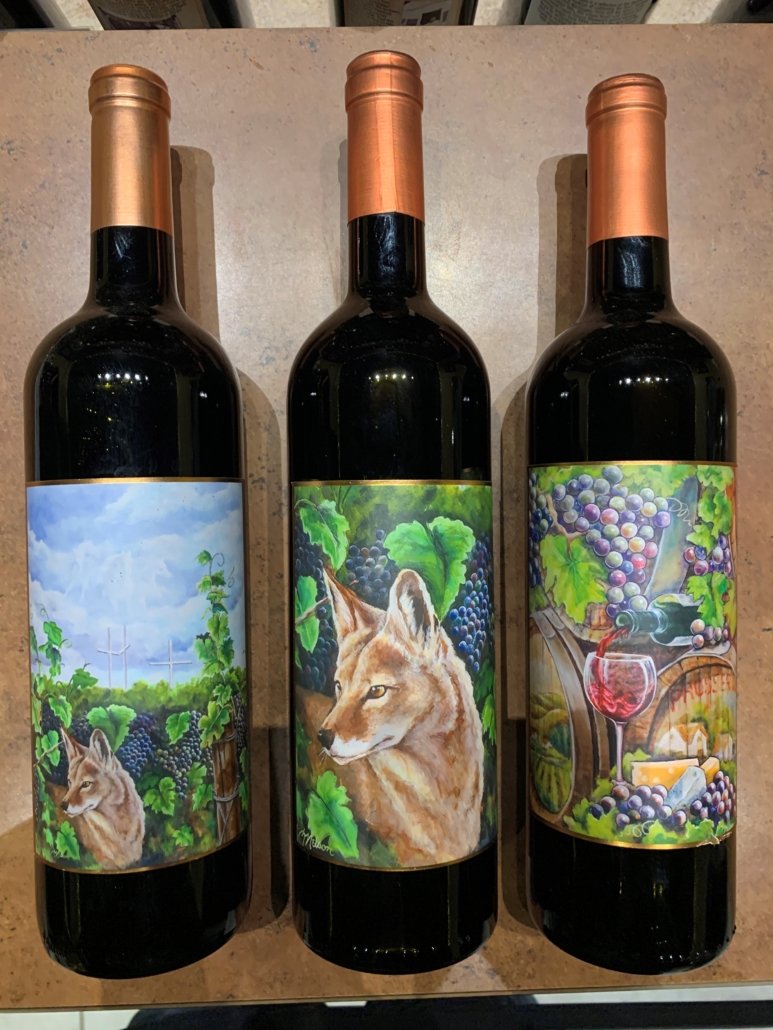
Coyote Canyon Winery is now selling collectors’ packages containing three bottles of Artist Series wine. Labels for every bottle of the series are the work of Mike Andrews’ talented artist wife Marti.
Another of Coyote Canyon’s most popular wines came about as the result of a conversation between Mike and his wife Marti, an accomplished, award-winning artist. “Marti had dozens of paintings lying around the house that featured grapes and wine barrels,” Mike explained. “One day during the 2013 Christmas holidays while we were tasting wine from barrels, Marti said: ‘Why don’t we create an Artist Series of wines using this wine as our first vintage and my paintings as labels for the wines?’”
The wine they were tasting that day, a 2012 vintage of Graciano, became Coyote Canyon’s first Artist Series wine. The 2013 vintage of the winery’s Petit Verdot became the second. The Artist Series wines needed labels, of course, so who better to design the labels than Marti. Today, labels painted by Marti wrap around the entire bottle of every Artist Series wine made by Coyote Canyon.
There are only a few bottles of the 2015, 2016 and 2017 bottles of Artist Series wines left in stock at the winery, and they are being sold in collectors’ packages of three. To purchase one of the remaining collectors’ packages, log onto: www.coyotecanyonwinery.com. When the website opens, click on the tab at the top of the Home Page that says “Buy Wines,” then jump to Page 5.
These days, Marti spends the majority of her days at her own business, an art gallery and gift shop in downtown Prosser, WA., called The Draw at Coyote Canyon. To make shopping for gifts and artwork even more pleasurable, visitors can enjoy a glass of beer or wine while shopping. And, you guessed it, among the wines she serves are her own inspirational Artist Series wines from Coyote Canyon Winery.
Marti has also designed labels for four wines that she sells exclusively at her downtown gallery – Downtown Red, Downtown White, Downtown Rosé and Downtown Roussanne. It’s worth a trip to Prosser just to taste these wines.
The Draw at Coyote Canyon is located at 1121 Meade Ave. Phone: (509) 832-0058. To learn more about The Draw, visit: www.facebook.com/TheDraw.Tavern.
With the Northwest’s wine judgings for 2021 barely underway, it’s clear the Andrews family’s grape growing and Michaud’s winemaking likely will continue that run of success.
At the Savor Northwest competition held March 8-10 in Cannon Beach, OR.., Coyote Canyon’s 2018 Cabernet Sauvignon, $28, and its 2018 Primitivo, $28, were both awarded gold medals.
And in March, what’s thought to be the Northwest’s largest-ever tasting of Tempranillo drew 73 entries from Washington, Oregon and Idaho. Coyote Canyon’s 2018 Tempranillo, $32, was the second-highest-ranked wine. The panel of judges rated it “Outstanding” — Wine Press Northwest’s highest rating.
For the last several years, Michaud has blended 5 percent of the Spanish red grape Graciano, also grown by Coyote Canyon Vineyards, into the winery’s Tempranillo. It’s a typical Spanish blend used traditionally in Rioja wines, usually with a bit of Garnacha (Grenache) as well.
Michaud thinks those high, lonesome Horse Heaven Hills share many characteristics with Rioja, since both are high desert plains. And the panel of judges, including one who’s admired Tempranillo for 40 years, agreed Michaud is right — and that Mike Andrews and his family were right to take a risk on Spanish varietals when they were so little-known in Washington.
Coyote Canyon Winery is located in the Winemakers Loft in Prosser’s Vintners Village. Address: 357 Port Ave., Prosser, WA. 99350. Phone: (509)786-7686. Hours are 11 a.m. to 5 p.m. Monday through Sunday. If you can’t get to Prosser to taste Coyote Canyon’s wine in person, you can buy it online from the winery’s on-line store at: https://buy-wines.coyotecanyonwinery.com and have it shipped directly to you.
EDITOR’S NOTE: Ken Robertson, a retired newspaper man, has been sipping and writing about Northwest wines for more than 40 years.

